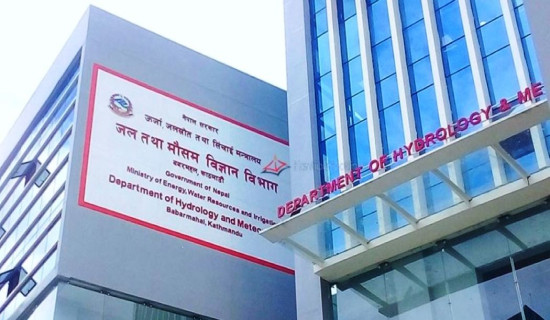- Sunday, 20 July 2025
Medical Records Improve Health System
The importance of accurate and comprehensive medical records cannot be overstated in the context of the evolving healthcare system of Nepal. There is no denying that the healthcare system is undergoing rapid transformation despite several infrastructural and technological challenges. Hence, the development and maintenance of proper medical records is both a necessity and a long-overdue reform. For efficient, safe, and patient-centered care, medical records are the backbone. People often mistakenly think that they are merely a collection of data; however, it is a critical tool for diagnosis, treatment, research, health system planning, and legal protection.
Medical records are systematic documentation of a medical history, clinical findings, diagnostic results, medications, treatment plans, and other relevant healthcare information. These records used to be in paper format and nowadays, in digital format and serve as an essential communication tool among healthcare providers. In rural healthcare settings and even in district hospitals in Nepal, the traditional use of paper records dominates. Regrettably, paper-based records are often incomplete, poorly stored, difficult to retrieve, and prone to damage or loss. Therefore, the lack of reliable record-keeping hampers proper patient care, affects patient safety, and limits opportunities for evidence-based practice, research and policy making.
Patient care
Medical records are used to enhance patient care and safety. Many patients in Nepal have to visit several medical facilities, sometimes even in separate provinces and within the provinces, the lack of a centralised medical record system forces each provider to start from the beginning. Thus, the possibility of wrong prescriptions, repetitive testing, misdiagnosis, medical errors, and ultimately, increased expenses results. Additionally, better clinical practices result in a medical record for health personnel, as they can go through previous diagnoses, therapies, and prescriptions. The value of medical records for chronic conditions where continuity of care is critical, such as diabetes, hypertension, tuberculosis, or mental illness, cannot be overstated.
Precise medical records offer important information for disease trend analysis, public health monitoring, and policymaking. Malnutrition, infectious disease epidemics, and maternal mortality are just a few of the many public health issues Nepal faces. The Ministry of Health and Population (MoHP) finds it challenging to collect trustworthy data for intervention planning, resource allocation, and program impact evaluation without appropriate records.
Additionally, medical information can be used to assess healthcare performance, find regional health inequalities, and guide evidence-based practices. Medical records have significant ethical and legal implications. Records are used as legal evidence to defend patients and healthcare practitioners in malpractice cases and medico-legal issues. Transparent documentation is becoming more and more necessary as patient rights are being more widely recognised in Nepal.
Furthermore, structured and safe electronic medical records better protect patient privacy and ethical norms. Confidentiality is difficult to maintain in paper-based systems, particularly in congested hospitals with shared record rooms. When properly maintained, digital medical records provide stronger traceability and privacy safeguards. Clinical research is essential for a nation like Nepal, which has a diverse population and a triple burden of infectious, non-communicable, and poverty-driven diseases. For researchers looking to assess treatment outcomes, comprehend disease trends, or examine the efficacy of public health initiatives, medical records are a treasure trove of information. However, the lack of structured data contributes to Nepal's poor clinical research culture.
Digitisation is the way of the future for healthcare, and Nepal cannot fall behind. Electronic Medical Records (EMR) lessen administrative load by streamlining data sharing, retrieval, and storage. To expand EMR systems throughout the public and private sectors, government funding and support are essential. One of the main priorities should be the establishment of a national health information exchange network where patient data is safely exchanged and preserved.
The advancement of medical record management in Nepal has been impeded by a number of obstacles. Medical and administrative workers frequently lack expertise in record-keeping or data management, many health centers lack even basic amenities like filing cabinets or computer systems, healthcare financing is already overstretched and medical record systems are not seen as an important priority. Despite the existence of Nepal's e-Health Strategy (2017), its implementation has been sluggish and lackluster, and patients in many rural areas do not desire records and providers do not recognize their worth.
Coordinated Efforts
Political will, awareness, and concerted effort are needed to address these problems. The government ought to invest in digital infrastructure, encourage the use of EMRs, and impose minimum requirements for record-keeping. The curriculum for physicians, pharmacists, nurses, and other allied health professionals should include courses in record-keeping. The need for proper documentation for patient care and institutional improvement must be made clear to healthcare workers. As a fundamental right, patients must be able to request their test results, medications, and medical history.
Clinical asset
Nepal must see medical records as a clinical asset rather than as paperwork if it wishes to realize the full potential of its healthcare system. Nepal may learn from successful EMR models in similar low-resource settings, such as Bangladesh, Sri Lanka, or Rwanda, so there is no need to start from scratch. With the aid of mobile-based platforms, pilot projects at primary health centres may open the door for widespread use. Furthermore, it is necessary to establish national standards and interoperability protocols to guarantee that all systems can communicate with one another, whether a patient is visiting a metropolis hospital or a rural clinic.
In conclusion, it is impossible to overstate the significance of medical records in Nepal. Although the path to a unified and effective record system is difficult, it is both essential and doable. The creation of a strong, contemporary, and patient-friendly medical record should now be given top priority as Nepal works to improve its healthcare system and achieve universal health coverage. Investing in this often-ignored component of healthcare could yield immeasurable dividends for generations to come.
(Dr. Lohani is the executive director at the Health Concern. lohanis@gmail.com)

















